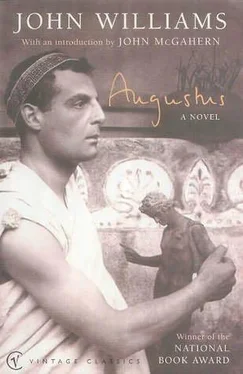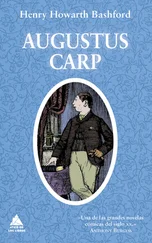John Williams - Augustus
Здесь есть возможность читать онлайн «John Williams - Augustus» весь текст электронной книги совершенно бесплатно (целиком полную версию без сокращений). В некоторых случаях можно слушать аудио, скачать через торрент в формате fb2 и присутствует краткое содержание. Жанр: Историческая проза, на английском языке. Описание произведения, (предисловие) а так же отзывы посетителей доступны на портале библиотеки ЛибКат.
- Название:Augustus
- Автор:
- Жанр:
- Год:неизвестен
- ISBN:нет данных
- Рейтинг книги:3 / 5. Голосов: 1
-
Избранное:Добавить в избранное
- Отзывы:
-
Ваша оценка:
- 60
- 1
- 2
- 3
- 4
- 5
Augustus: краткое содержание, описание и аннотация
Предлагаем к чтению аннотацию, описание, краткое содержание или предисловие (зависит от того, что написал сам автор книги «Augustus»). Если вы не нашли необходимую информацию о книге — напишите в комментариях, мы постараемся отыскать её.
Augustus — читать онлайн бесплатно полную книгу (весь текст) целиком
Ниже представлен текст книги, разбитый по страницам. Система сохранения места последней прочитанной страницы, позволяет с удобством читать онлайн бесплатно книгу «Augustus», без необходимости каждый раз заново искать на чём Вы остановились. Поставьте закладку, и сможете в любой момент перейти на страницу, на которой закончили чтение.
Интервал:
Закладка:
I shall not subject you, my dear Sextus, to one of my disquisitions; but it seems to me more nearly true, as the years pass, that those old "virtues," of which the Roman professes himself to be so proud, and upon which, he insists, the greatness of the Empire is founded-it seems to me more and more that those "virtues" of rank, prestige, honor, duty, and piety have simply denuded man of his humanity. Through the labors of the great Octavius Caesar, Rome is now the most beautiful city in the world. May not its citizens now have the leisure to indulge their souls, and thus lead themselves, like the city in which they live, toward a kind of beauty and grace they have not known before?
III. Letter: Gnaeus Calpurnius Piso to Tiberius Claudius Nero, in Pannonia (9 B. c.)
My dear friend, I include herewith those reports you have asked me to gather. They come from a variety of sources, which for the time being I shall not name, in the unlikely event that eyes other than your own might see this. In some cases I have transcribed the reports verbatim; in others I have summarized. But the pertinent information is here; and you may be assured that the original documents are safe in my possession, in the event that you might, at a later time, wish to use them.
These reports cover the period of one month, November.
On the third day of this month, between the tenth and eleventh hours of the day, a litter borne by the slaves of Sempronius Gracchus arrived at the lady's residence. The litter was evidently expected, for the lady emerged quickly from her house, and was borne across the city to the villa of Sempronius Gracchus, where a large party was assembled. During the banquet, the lady shared Gracchus's couch; they were observed to carry on a long and intimate conversation. No report of the substance of this conversation is available. A good deal of wine was consumed, so that by the end of the banquet many of the guests were inordinately gay. The poet Ovid read for their entertainment a poem of his that fit the occasion, which is to say one that was suggestive and improper. After this reading, a troupe of mimes performed The Adulterous Wife, but more brazenly than is usual. There was music afterward. At some time during the musical performance, people began to drift out of the hall; among these were the lady in question and Sempronius Gracchus. The lady was not seen again until near dawn, when she was observed entering the litter that had waited for her outside Sempronius Gracchus's residence. Thence she was transported to her home.
Two days before the Ides of this month, the lady entertained a group of her friends on her own responsibility. Among the male visitors were Sempronius Gracchus, Quinctius Crispinus, Appius Claudius Pulcher, and Cornelius Scipio; among the lesser guests were the poet Ovid and the Greek Demosthenes, the son of the actor and recently a citizen of Rome. The drinking of wine began early, shortly before the tenth hour, and continued late into the night. Though some of the guests left after the first watch, a larger number remained; and these late stayers, led by the lady, quit the rooms and the gardens, and made their way into the city, coming to a halt in their litters among the walks and buildings of the Forum. Though the Forum was nearly deserted at that hour, yet a small number of townspeople and tradesmen and police observed the party, and may be persuaded to testify, if the need arises. The drinking of wine continued, and that Demosthenes, the son of the actor, for the entertainment of the partygoers, delivered a mock oration from the rostrum beside the Senate House. It was extempore, and no copy could be made; but it seemed to burlesque the kind of speech that the Emperor has often delivered from the same spot. After the speech, the party disbanded; and the lady returned to her home, accompanied by Sempronius Gracchus. It was nearing dawn.
For the next six days nothing untoward occurred in the lady's activities. She attended an official banquet at the home of her parents; with her mother, she sat with the four elder Vestal Virgins at the theater; she attended the Plebeian Games, and remained circumspectly in the box with her father and his friends, among whom were the consul of the year, Quinctius Crispinus, and the proconsul Julius Antonius.
On the fourth day after the Ides, she was guest of honor at the villa of Quinctius Crispinus at Tivoli. She was accompanied on her journey to Tivoli by Sempronius Gracchus and Appius Claudius Pulcher and a retinue of servants. The weather being mild, the entertainment was held out-of-doors; and it continued far into the night. There was much wine, there were male and female dancers (who did not confine their performances to the theater on the grounds, but danced, nearly naked, among the guests, who wandered about the grounds), and musicians who played Greek and Eastern music. At one time, a number of guests (the lady in question among them), both male and female, plunged into the swimming pool; and though the torchlight was dim, it could be seen that they had divested themselves of their clothing, and were swimming freely together. After the swimming, the lady was seen to retreat into the wooded part of the garden with the Greekling Demosthenes; they did not return for several hours. The lady stayed at the villa of Quinctius Crispinus for three days, and each evening was much the same as the other.
I trust, my dear Tiberius, that these reports will be of use to you. I shall continue to gather the information that you require, in as discreet a manner as I can. And you may depend upon me in any eventuality.
IV. Letter: Livid to Tiberius Claudius Nero, in Pannonia (9 B. c.)
You are to obey me in this, and you are to obey me at once. You are to destroy all the "evidence" that you have so painstakingly gathered, and you are to inform your friend Calpurnius that he is to do nothing more of this nature in your behalf.
What, may I ask, did you propose to do with this "evidence" you think you have? Do you propose to use it for a divorce? And if so, is the cause that your "honor" has been sullied? or do you dream that you will advance our cause by means of this divorce? In any of these fancies you are in error, and seriously so. Your "honor" will not be sullied as long as you remain abroad, for it will be clear to everyone that your wife is not under your control in such a circumstance, especially since you are serving your country and your Emperor; if on the other hand it comes to light that you have been gathering "evidence" and withholding it until a propitious time, then you will seem a fool, and all the honor that you may have gained shall have been lost. And if you dream that you advance yourself by insisting upon a divorce, you shall be mistaken again. Once such a step is taken, you will have no connection to that power we both have dreamed of; your wife may be "disgraced," but you will have gained nothing from that; you shall have lost the beginning that we have made.
It is true that at the moment it seems you have no chance to fulfill our mutual ambition; at the moment, even Julius Antonius, the son of my husband's old enemy, has been advanced beyond you, and is as close to the accession of power as you are. Except for your name. My husband is old, and we cannot be sure of what the future will bring. Our weapon must be patience.
I know that your wife is adulterous; it is likely that my husband knows it also. Yet if you invoke those laws which he has made, and force him to punish his daughter by them, he will never forgive you; you might as well never have sacrificed your personal life in the first place.
We must bide our time. If Julia is to bring disgrace upon herself, she must do it herself; you must not be involved in any way, and you will be able to remain uninvolved only if you are careful to stay abroad. I urge you to lengthen your business in Pannonia as long as you reasonably can. So long as you remain away from your household, and away from Rome, our cause remains alive.
Читать дальшеИнтервал:
Закладка:
Похожие книги на «Augustus»
Представляем Вашему вниманию похожие книги на «Augustus» списком для выбора. Мы отобрали схожую по названию и смыслу литературу в надежде предоставить читателям больше вариантов отыскать новые, интересные, ещё непрочитанные произведения.
Обсуждение, отзывы о книге «Augustus» и просто собственные мнения читателей. Оставьте ваши комментарии, напишите, что Вы думаете о произведении, его смысле или главных героях. Укажите что конкретно понравилось, а что нет, и почему Вы так считаете.











